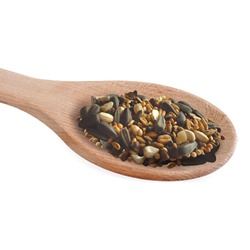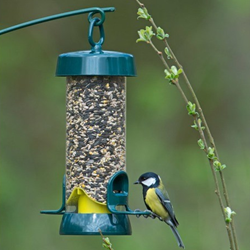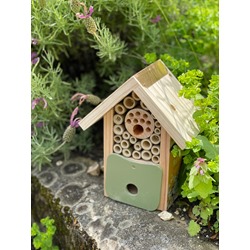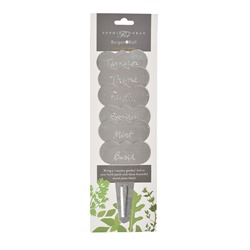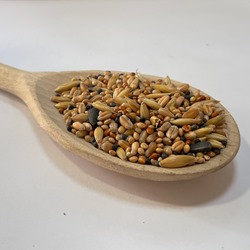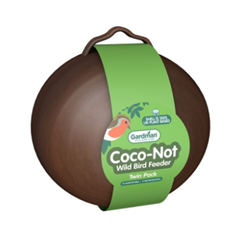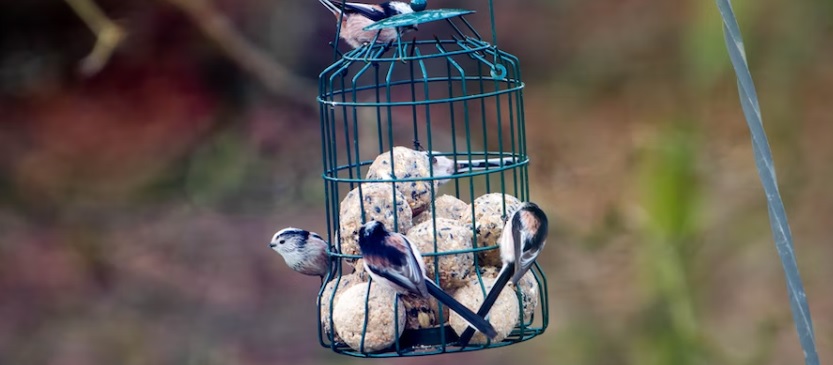
Bird feeding is an excellent, worth-while and rewarding activity. Birds in areas with bird feeders are generally in overall better health than those who have no access to supplementary nutrition, especially during periods of inclement weather. By giving them the nutrients they require at the time they need them, we can make a world of difference for the futures of our winged friends.
Why should we feed the birds?
- It helps adult birds spend less time foraging and wasting energy to feed their nestlings
- It gives you the chance to observe the wonders of nature
- It encourages healthy, long-lived birds
- It provides birds with food during cold and barren months
- It aids the growth of baby birds, so that they can thrive
I have a small garden - can I still feed the birds?
Absolutely! Did you know that the total acreage of gardens in the UK is actually bigger than all UK nature reserves put together?
A smaller garden means less maintenance, and while it also means less room, you should still be able to see an abundance of garden birds enjoying your outdoor space if you provide the correct nutrients and accessories.
READ MORE: How to Feed Birds in a Small Garden
Everything you need to know about bird food
The essentials:
There are six main types of bird food that you can choose from: seed mix, sunflower seeds, peanuts, suet products, live mealworms, and niger seeds. You can browse them all by clicking the button below!
Shop All Bird Food
Birds do tend to have preferences too, just like you and me! For instance, certain birds like to have their feet on the ground whilst they munch away, such as Robins, Dunnocks, and Blackbirds. You can tailor your garden to attract them by implementing a simple perch ring or a window feeder so that they feel comfortable.
Also, you'll often find clinging birds such as the Tit family and the Great Spotted Woodpecker hanging onto a feeder.
As you can see, the best bird feeding tip is to provide different types of feeders and food for different species of garden bird.
How many types of food should I provide?
If you wish to attract a wide range of birds, you should offer a variety of high-quality food types in a range of different feeders. This way, you'll cater to every type and preference, and be rewarded with an abundance of different local birds right on your doorstep.
Is the quality of the bird food important?
Of course! You wouldn't want to be eating low-quality food, and neither do they. By providing the birds with the highest quality food and cleanliness of feeding environment, they will be more likely to return. If you offer them nutritious food and keep the supply fresh, they'll be sure to come back time and time again.
How can you tell the difference between high and low quality bird seed mixes?
- High quality - a good percentage of nutritious and high-oil seeds, such as: black sunflower seeds, sunflower hearts, peanuts, peanut granules, oil seed rape and niger seed.
- Low quality - a high percentage of wheat and maize as a bulking agent, split peas, beans
- High quality – has very little dust present since seeds have been double cleaned for optimal cleanliness
- Low quality – there will often be obvious dust on the seeds and left in the bag and food like black sunflowers will have a high content of sticks and twigs which will block feeders.
Most of the ingredients found in low-quality bird seed should not be fed to birds, so it is advised to avoid purchasing poor quality seed mixes.
You can also tell if you have purchased low-quality bird seed, as you will begin to see your garden inundated with larger birds such as Pigeons, Doves, Rooks and Jackdaws. These bigger birds can easily dominate feeding areas, taking away time and space from smaller garden birds. If your garden is being dominated by larger birds, try swapping to a wheat-free bird seed mix for a while.
What should I feed birds during breeding season?
February through to August is known as the breeding season in the UK and this is the special time where birds settle down to reproduce. During this season, birds will be feeding young chicks, so they may have a bit of a different palate!
It's important to provide high-protein food during this time, such as live mealworms and wax worms - these will go down a treat with baby birds!
Adults will always feed their young before themselves, often relying on remaining seeds. Sunflower hearts are the perfect solution in this situation, as they offer a substantial source of energy and they are high in oil, contributing to growth and warmth.
What should I feed birds during the winter?
We all know that the UK can get very cold. Sadly, small birds such as Blue Tits and Long-Tailed Tits spend up to 85% of their winter days feeding to stay alive.
High-quality fat products such as suet pellets and fat balls will provide them with the highest supplementary heat supply.
Everything you need to know about bird feeders
What are the different types of bird feeder?
There are many different types of bird feeder depending on the type of food you'd like to offer in your outdoor space. Here are just a few...
A steel mesh feeder which prevents birds taking whole peanuts and hoarding them! The mesh also provides a clinging area for the birds. A 6mm mesh size is optimal, because it's large enough to prevent beak damage, yet small enough to hold the peanuts back.
Provide your garden birds with a high-energy treat! Our range is incredibly visually appealing, so you don't have to worry about ruining your garden aesthetic.
Perfect for small gardens with minimal space - see your winged friends up close and personal.
You could very easily make a feeding station the pinnacle of your garden! You can either customise them to create your own unique bird buffet, or you can purchase a feeding station with an assortment of feeders included.
These feeders are extremely versatile yet simple - they are suitable for many food types, so they can bring in all manner of birds.
A classic feeding option! Their simple yet diverse design makes them a suitable option for those looking to draw in all and any types of bird. They're very adaptable, too - just scatter your food and watch the birds flock in.
You can add these to your feeding station or mount this to your window. They're hygienic, practical, and every easy to clean.
Niger seed is a great alternative to thistle seed - it's a tiny black seed that grows in Ethiopia. Due to their size, niger seeds must be fed from a special feeder. These feeders have tiny slits instead of holes, which works in the favour of Goldfinches and Siskins due to their extremely pointed bills.
We all know that mealworms crawl and wriggle, so it's important to choose a suitable feeder. These feeders will ensure there are no escape artists!
Having a bird-friendly garden can help promote a healthy local ecosystem as birds are an essential part of the environment. They can also be a delight to watch from the windows as you have your morning coffee. If you have any questions on what you can do to make sure your garden is bird-friendly, contact our team today and we'll do everything we can to guide you.
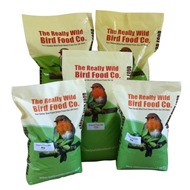 Back
Back Bird Foods
Bird Foods  Seed Mixes
Seed Mixes Straight Seeds
Straight Seeds Mealworms & Worms
Mealworms & Worms Chicken Feed
Chicken Feed Duck Food
Duck Food Peanuts & Peanut Butter
Peanuts & Peanut Butter Suet & Fat Balls
Suet & Fat Balls No Mess Bird Seed
No Mess Bird Seed  Wheat Free Bird Seed
Wheat Free Bird Seed Sunflower Seeds
Sunflower Seeds Softbill Bird Food
Softbill Bird Food Bulk Bird Seed
Bulk Bird Seed Trial Packs
Trial Packs Pick & Mix
Pick & Mix Mini Pick & Mix
Mini Pick & Mix Birdie Basics: Budget Bird Food
Birdie Basics: Budget Bird Food Food for Small Birds
Food for Small Birds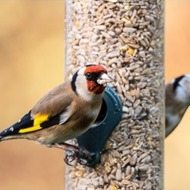 Back
Back Bird Feeders
Bird Feeders  Seed Feeders
Seed Feeders Peanut Feeders
Peanut Feeders Peanut Butter Feeders
Peanut Butter Feeders Suet & Fat Feeders
Suet & Fat Feeders Window Feeders
Window Feeders Hanging Feeders
Hanging Feeders Feeding Stations
Feeding Stations Ground Feeders
Ground Feeders Easy Clean Feeders
Easy Clean Feeders Bird Tables
Bird Tables Seed Trays
Seed Trays Bird Baths & Drinkers
Bird Baths & Drinkers Feeder Accessories
Feeder Accessories Feeder Hygiene
Feeder Hygiene Squirrel Proof Bird Feeders
Squirrel Proof Bird Feeders For the Kids
For the Kids Niger Seed Feeders
Niger Seed Feeders Mealworm Feeders
Mealworm Feeders Bird Food Storage
Bird Food Storage Fat Ball Feeders
Fat Ball Feeders Tube Feeders
Tube Feeders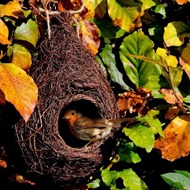

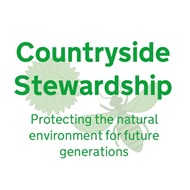

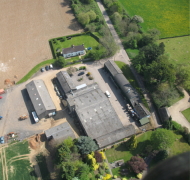 Our Farm
Our Farm  Tips & Advice
Tips & AdviceContact Us

